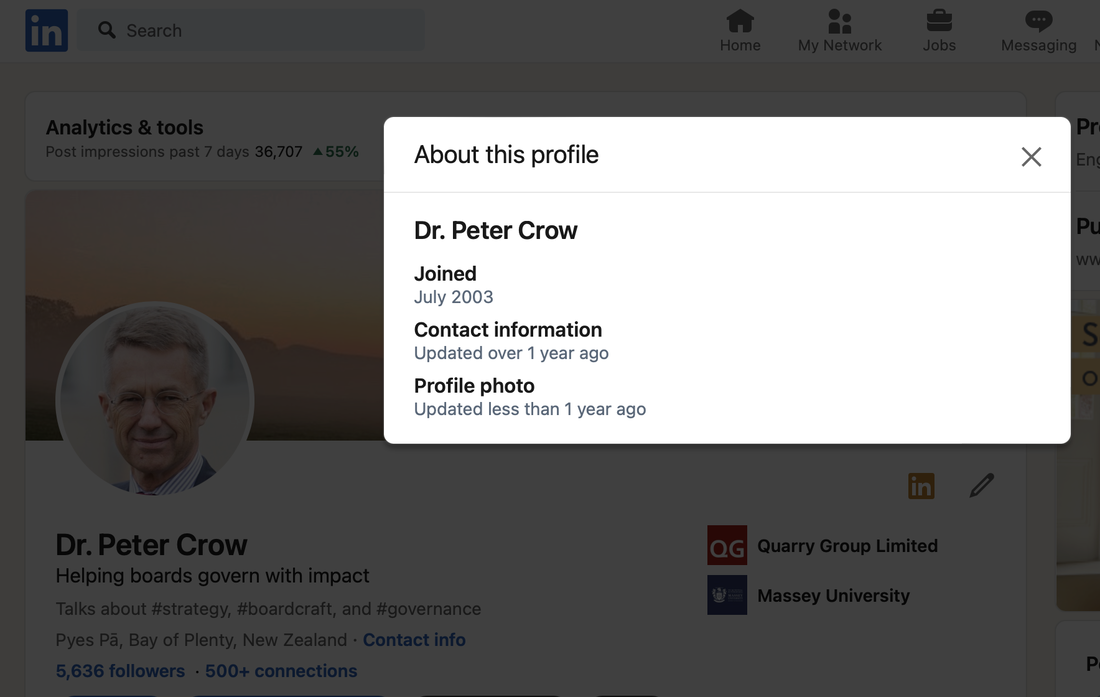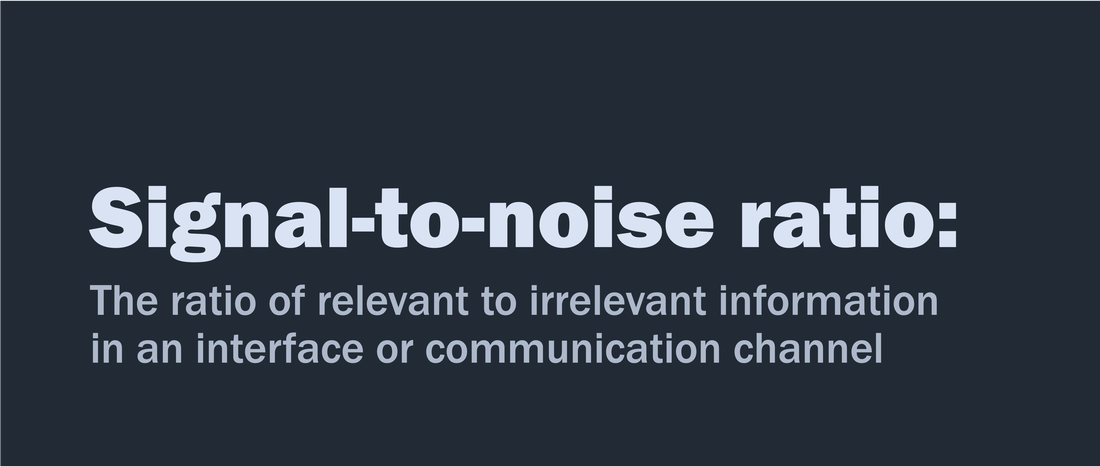|
Boards, and an oft-mentioned but mysterious concept—governance—are topical. Daily, it seems, these terms feature in our newspapers and on social media, usually because something has gone wrong. And when it does, the chattering class is not slow to react. Typically, the targets of their comments are the board and management of the organisation. That seemingly strong organisations suffer significant missteps—or even, fail outright—on a fairly regular basis is worrisome; the societal and economic consequences are not insignificant. What can be done? Recently, the inimitable Mark Banicevich invited me to discuss boardroom success and failure, and to offer guidance that boards wanting to lift their game may wish to consider. Hopefully, our discussion is helpful and enlightening. Regardless, I welcome questions and comments, either here or send me an email. This is my second conversation with Mark (the third will be published in May). If you missed the first, you can access it here: Governance around the world.
0 Comments
As regular readers know, I read widely; topics I explore span (in addition to core themes of corporate governance and strategy) include philosophy, neuroscience, business, history, military strategy and more besides. I usually take notes, as an aide memoire for later reference. Some articles are memorable, others less so. This one recently-published article piqued my attention because it reminded me of a question I face most weeks: "What do you do?" Most enquirers expect to hear a job title or a profession, to enable them to 'position' me, which is fine if the 'job' is a well-known profession or vocation, such as a doctor, teacher, plumber or lawyer. But what about a director, or an advisor? Is offering a one-word response helpful? Might it enlighten or obfuscate? For those who understand the roles of director and advisor, one-word descriptors are adequate. But for others (the majority, even most?), the response is more likely to an awkward smile, as if to say, "I wonder what one of those is or does? Does he mean a company director, a movie director, an orchestra conductor, or something else?" or, "What is an advisor? It sounds like a fancy name for a consultant." What an unhelpful interaction! Clarity and simplicity are vital if we are to communicate effectively. And the effectiveness of what we utter—whether our message got through—is determined by the listener not the speaker. With this in mind, I try to read the person before answering. If they appear knowledgeable of business matters, I tend to say I work with boards, sometimes adding that I help them see around corners and govern with impact; an advisor. But if not, I say I'm a troubleshooter who works with business leaders, or something along those lines. One thing I never say: I'm a consultant—they are people who make decisions and implement things for others. I don't. Rather, I ask questions to gain insight and make suggestions. Whether the client takes up the advice or not is their decision. So, returning to the headline question. The words we utter: do they matter? Yes, they surely do, if we are to communicate well.
The prospect of looking back on the year past at this juncture seems a little odd, even presumptuous, given five weeks remain in 2023. And yet, with the onset of the holiday season (Christmas, Hanukkah, Diwali, as relevant in your cultural setting), I have noticed minds are starting to turn; casual comments in my hearing indicate some people are starting to reflect on the year soon-to-be-gone; others upon what the future might hold. As someone called on to think broadly about organisational challenges and opportunities, and to share insights that might be helpful to helping boards govern with impact or realise organisational potential, I too, take time to ponder. To think about what has passed, what lies ahead, and how one can help is not only smart, it is vital—if one is to learn, make adjustments to stay on track and achieve goals and, over time, become a better person. Turn now to the person you see in the mirror. What did you set out to achieve in 2023? Did you set specific goals? If so, have you checked progress? Are you still on track? Have you taken into account changes in the environment around you and made adjustments, or have you pressed on in spite of changing circumstances? As a leader, you owe it to yourself—and all those you interact with—to check progress periodically and make adjustments if you have veered off track or lost sight of the goal. For the record, my goal for 2023 was audacious; to ensure every director and board I had the privilege of serving, globally, derived some benefit from the interaction. The goal was audacious because 'every' set a high bar; essentially, it left no room for slippage! Thankfully, feedback to date suggests I'm doing OK. Hopefully, the feedback still to come is consistent with that received through the year. If it is, I'll wrap up the year contented; tired but contented.
When I was a boy, milk was free (I was raised on a dairy farm), but you could buy it in a glass bottle with a silver foil top (pasteurised but not homogenised) for four cents a pint at the general store. Television (once we got one, in 1969, to see the Apollo 11 moonshot) was a grainy, black-and-white experience, with a single channel available. You got to watch whatever the broadcaster chose to deliver across the airwaves. Now, milk costs several dollars a litre, but it comes in many different styles (blue, light blue, skim, lo-fat, full-cream, calcium fortified, lo-lactose and UHT—as well as products called milk that contain no milk at all, such as oat milk and almond milk, in a wide variety of packaging options). Television has changed too: from a take it or leave linear broadcast experience via rabbit-ear antennae, to a plethora of video-on-demand (streaming) options via the internet. These are but two of thousands of examples that illustrate the onwards match of technology. Oh how life has changed, even in my lifetime. The onward march has also affected the way we communicate, not only personally with family and friends, but also with clients, suppliers and the general public as well. The notion of using a fountain pen to handwrite a letter, or making a toll call, seems quaint now—but some of us still value these moments. The emergence of social media has extended our reach in ways not thought possible twenty years ago. Sharing business cards, once commonplace, is now rare. If people want to contact me or learn about me, they tend check my LinkedIn profile (notice the assumption, that I have one), even before mentioning Google or asking about a website or blog. And that brings me to the point of this muse, which is to share one aspect of a conversation with an esteemed company director, in the hope it might encourage others committed to serving the director community. Yesterday, I was asked about the role of social media in my business life, what channels I use and how long had I been using these. The first two questions were readily answered; the third took a little longer—because I needed to find the menu option!
Thank you for permitting me to share my experience. I hope anyone considering using social media or a blog as a channel might be encouraged—not only to do so, but to stick at it over the longer term. My journey to date has been fulfilling; I have met thousands of people from many walks of life and, I hope, they have valued the interaction as much as I have.
I have just arrived back in New Zealand, from ten days in the UK and Europe. My meetings with directors, advisors, academics, students and directors’ institutions had two primary objectives: to listen and to share. The listening aspect was to gain firsthand knowledge of issues and opportunities; the sharing aspect to provide updates on the craft of board work and my experiences as a practicing director. Learnings (a few immediate observations, in no particular order):
Amongst it all, there were some gems:
Several followup visits are now being planned, to advise, assess, educate and speak on topical board and organisational performance matters. If you want to discuss a matter of interest, or check my availability to assist, contact me for a confidential, obligation-free discussion. The headline picture, showing a derelict property in Soho, London, is analogous to the state of governance in many places in Europe: structurally sound but outwardly messy.
When aiming to achieve something in business, is it better to be good, or effective, or both? Should boards for example pursue good governance, or prioritise effectiveness? And, are these qualifiers mutually exclusive, or can a board claim both? These 'challenge' questions have beset contemporary boards of directors, more so as various stakeholders have sought to impose their expectations and ideological preferences onto corporate values, purpose, strategy and decision making. If these questions are to be considered and answered well, agreement on the meaning of the adjectives is necessary. To wit:
Instinctively, good governance sounds attractive. It satisfies a human condition; of doing the right thing and acting in the best interests of someone else (a particular stakeholder interest, for example). But what if doing the right thing has the effect of compromising the competitive position of the company; the achievement of agreed performance objectives; or, potentially, the viability of the company? And, what might be considered good by one person or group may not be upheld elsewhere. Turning to effectiveness, the threshold is more objective—either the goal is achieved or it is not. But, what if the pursuit of an agreed objective results in environmental or social harm, or some other negative consequence? That is not acceptable either. Given the extremes, some sort of balance is needed, in the same way that every board must ensure conformance requirements are satisfied (compliance, value protection) and performance objectives are achieved (value creation). If this is reasonable, should a different adjective be used, to more adequately describe the value of the board's work? My recommendation: drop goodness and effectiveness, for one (at least) is highly subjective and has become emotively charged (think, what ESG has become), and the other focuses more on the goal without necessarily considering unintended consequences. Ultimately, in extremis, neither is sustainable without the other. Instead, boards should pursue enduring impact. Boards that strive to be effective in role without incurring social or environmental harms are more likely to exert a positive and enduring influence beyond the boardroom (that is, have impact). As a result, they should be well-regarded by shareholders and legitimate stakeholders as well. The Strategic Governance Framework offers insights to boards intent on realising the full potential of the companies they govern.
And with little more than a blink, January 2023 is, nearly, done. January is, for me, a time to relax, reflect on the year past, spend time with family and friends, read and get ready for what lies ahead. In the last ten days, things have started to ramp up again: international calls, my first board meeting for the year, and local enquiries—all indicators that minds are turning to board work and the pursuit of sustainable performance once more. Soon, I shall be travelling again too, in response to requests to discuss corporate governance, board work, and the role of the board in realising organisational potential. After a good break, I not only feel ready for what lies ahead, but excited at the opportunity to help boards and directors, academics and regulators grapple with some complex issues. The first three trips for the year are scheduled, as below—and planning is already underway for several more in the months to come. While events and engagements are being loaded into the diary daily, some gaps remain, mainly in Singapore and England. So, if you want to take advantage of me being in your neighbourhood, best to get in touch soon! If you want to talk or meet, but the timing doesn't suit, let me know anyway—there will be opportunities later in the year.
The claim, that a picture is worth a thousand words, is widely known. Pictures are valuable because they capture one's attention, often evoking memories of significant or special events (as real of imaginary as they may be), or of possibilities. Indeed, the phrases 'every picture tells a story' and 'the picture tells the story' encapsulate the essence of pictures—they tell stories. But visual images are not the only means of stimulation and sharing ideas. Words are important too, especially when the ideas they convey are presented as a story. Over the seasonal break, I have been delving into a selection of books, in search of stories and ideas. The very practice of reading is, I find, a powerful enabler—to provoke, gain insight, form opinions, and learn and build knowledge about all manner of things. I have also gone back through the Musings archives and re-read many older posts. Several that piqued my attention were re-posted on LinkedIn (check my feed) to share with a new generation of readers. To my great surprise, many of these re-posts garnered considerable attention and engagement. That some ideas continue to be relevant is gratifying. Thank you to readers who have engaged with those posts. Notice the mechanism at play: hearts and minds are captured through 'story'. Pictures and words are important without doubt, but they are, simply, delivery channels: two of four mechanisms (the others being aural and kinesthetic (experiential)—together, VARK) to communicate the message. Information and its effective delivery is crucial in organisations too; board work in particular. In such situations, stories can be incredibly influential for informed decision-making, a precursor of all that follows:
As managers and directors, the way we present and consume written reports, and ask and answers questions, is material to informed decision-making. Ultimately, the board's provision of effective steerage and guidance to achieve the organisation's strategic goals depends on it. Such is the craft of board work. With this in mind, what refinements might you consider to lift your game in 2023, and lift the effectiveness of your board?
The role and contribution of the board of directors in companies has become a source of fascination for many; curiosity growing with each corporate failure or significant misstep emanating from the boardroom. On paper, the role of the board is straightforward: to steer and guide the company towards agreed objectives. The legal framework within which directors operate is both stable and adequate, duties are specified and the principles are clear. So, what could possibly go wrong? Guidance to help boards govern well is not in short supply. Many researchers have postulated the configuration of the board is material to effectiveness and outcomes; some say the key lies in board process and policy; and yet others point to boardroom behaviour. Consulting firms and directors' institutions have proposed models too. While these proposals are enticing, failure studies and other analyses suggest none provide surety in terms of helping boards operate effectively in practice. One of the reasons reliable guidance remains elusive is that board work is far from straightforward. Long-term studies of boards informed by direct observations of boards in session are few and far between. And, boards need to consider many things, debate options, weigh up risks and, ultimately, make decisions—all within an environment characterised by ambiguity and change. And if that is not enough, the board does not operate the company, the executive does. If a board is to have any hope of discharging its duties, much less govern well, a solid foundation is crucial. That means directors need to understand their role and duties, and make sense of information.
If a board is to exert any meaningful influence beyond the boardroom, directors first need to understand the duties of a director and role of the board. Competence gaps are not tolerated in medicine or engineering: No one would expect a doctor to use a carpenter’s tools, or accept crayon drawings from an engineer. And yet such acceptance is tacit amongst directors and shareholders. What is more, if a director transgresses, the likelihood of being held to account before the judiciary is relatively low. A commitment to professional development, and the professionalisation of directorship, are proposed as mechanisms to close the competence gap. Once in the boardroom, directors need to apply their collective knowledge and expertise, maturity and wisdom as they consider information, distinguish signal from noise, and make decisions. If that can be achieved, the likelihood of the board making an effective contribution greatly is enhanced. The gap between the board's provision of steerage and guidance (i.e., governance) and business performance has been at the core of my work over the past two decades, motivating my formal research, practical enquiry and contributions as a director. If you would like an update on recent progress, please contact me.
December is a significant month for many peoples around the world. It is the month in which two of the three great Abrahamic faiths have a major festival (Jews, Hannukah; Christians, Christmas), and the Japanese observe Omisoka. For others not professing a faith, December is significant to the extent that it marks the end of the Julian calendar. Each of these observances is distinctive, but a common thread runs through them: celebration and dedication. Yes, December is a time to reflect on the year gone and give thanks, and to ponder what lies ahead. Through this muse, I too wish to give thanks, to the many board directors, business leaders and students that I have had the good fortune to work with during 2021—both in person in New Zealand, and via video link in the United Kingdom, the European Union, the Caucasus region, North America and the Caribbean, India, several African and Middle Eastern countries, and closer to home in Australia. I have learnt a lot, and hope others have derived value from the interactions. Thank you. Peering into 2022, the prospect of travelling internationally to work in person with boards and students is enticing. Once the coronavirus situation stabilises, border restrictions are relaxed and travel becomes viable again, I will accept bookings. But in the meantime, I have decided to take on a new project. For over two decades now, I’ve had the privilege of working with aspiring and established directors on five continents, helping them wrestle with problems, consider opportunities, make decisions and learn what it means to be an effective director. Over the same period, two friends have encouraged—even nagged—me to consolidate my ideas, experiences and insights into a book. And each time it has been mentioned, I have pushed the idea away, citing lack of head space. But circumstances have changed in 2021 and the time now seems right to reconsider the prospect of writing 50,000 words about governance and the craft of board work. So, that is what I will attempt in 2022. (*) The image shows the Marsden Cross, which marks the location of the first Christian mission settlement in New Zealand, and the spot Samuel Marsden preached the first Christian service, on 25 December, 1814.
|
SearchMusingsThoughts on corporate governance, strategy and boardcraft; our place in the world; and other topics that catch my attention. Categories
All
Archives
May 2024
|
|
Dr. Peter Crow, CMInstD
|
© Copyright 2001-2024 | Terms of use & privacy
|










